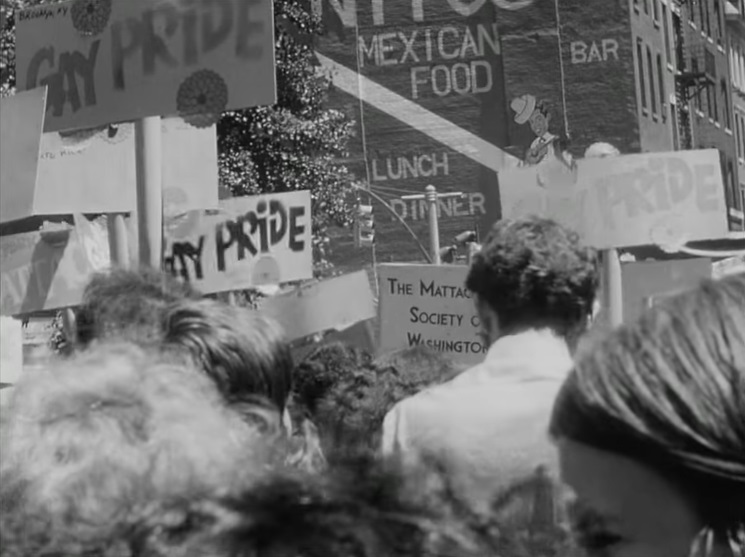
By Jessica Dickinson Goodman
In the past 30 days, according to The New York Times, American homosexuals have shouted at a gubernatorial candidate on the street, forced the American Medical Association into private session, published theses and books, debated the "frivolous"ness of their rights with U.N. Youth Assembly delegates, been the subject of a positive resolution at the Lutheran Church in America's biennial convention, a negative note from a Vatican aide.
And perhaps most powerfully, they marched.

"Thousands of young men and women homosexuals from all over the Northeast marched from Greenwich Village to the Sheep Meadow in Central Park yesterday proclaiming 'the new strength and pride of the gay people.'"
But it was a derisive article in The New York Times about a debate between young feminists in Vancouver and Canadian Prime Minister Pierre Elliott Trudeau that showed the end result of all of this work. The main focus on the article – and the debate – was abortion, but the 1969 "legalization of homosexual acts by consulting adults" came up as well. Prime Minister Trudeau was seeking to make the point that the feminists he was debating were putting the legal reform chicken before the "public morality" egg, that is, that rather than hassle powerful men like him these young women should instead embark on a project to "change the public morality."
Be careful what you wish for, Mr. Prime Minister.
Homosexual activists who are routinely subjected to police harassment and graft perhaps understand intuitively that in this case, the egg must come before the chicken. In the words of Whitman Knapp, New York City Mayor John Lindsay's pick to investigate policy corruption: “Speaking as an individual, I have felt for a long time that the nature of our laws dealing with such problems as gambling, the Sabbath and sex are a continuous temptation and therefore an important source of corruption.”
Change the laws, change the hearts of men.
Bar raids and beatings, shakedowns and vice stings, closets and forced chemical castration, illegal marriage, loss of children, housing and job discrimination, criminalization and social contempt – it is no wonder homosexuals have something to say about their daily existence in the United States of America this summer. And no wonder that they want to change their situation and are focusing on elected officials to do it. Rather than Prime Minister Trudeau's perhaps self-protective request to be left alone to craft laws while others do the work of moving the hearts of the public, activists across the American continent treat reforming the nation's laws as a crucial step towards true equality.
U.S. Supreme Court Justice Thurgood Marshall perhaps said it best the year before he rose to the court.
"There is very little truth to the old refrain that one cannot legislate equality. Laws not only provide concrete benefits, they can even change the hearts of men – some men, anyhow – for good or evil."
How does one change a law? Generally speaking, most people in politics have a theory about where power comes from – secret or stated, they reveal it in how they operate. Some believe power comes from money; others from social status; still others from rules; some from God; and finally, there are those who believe power comes from people. The pro-homosexual actions from paragraph one betray the power theory of the activists who undertook them, but I suspect – showing my own biases – that it will be this summer's marches that move us more closely to that oft promised land where all people are created equal and judged equally under the law.

"they gathered to protest laws that make homosexual acts between consenting adults illegal and social conditions that often make it impossible for them to display affection in public, maintain jobs or rent apartments."
On June 29, 1970 The New York Times' Metropolitan section reported:
Declaring their “new pride,” thousands of homosexuals from all over the Northeast rallied in Sheridan Square in Greenwich Village, marched in a 15‐block procession to Central Park and held a “gay‐in” in the Sheep Meadow. They were protesting “oppressive” laws and social conditions.
Pride. Thousands. Seeking to change laws and social conditions.
It wasn't just New York City: in Washington, Boston, and Cleveland; in Ivy League colleges and suburbs, people protested. Protestors chanted "Say it loud, gay is proud."
They knew who their audience was. Martin Robinson, 27, a carpenter running political affairs for the Gay Activities Alliance said: "It serves notice on every politician in the state and nation that homosexuals are not going to hide any more. We're becoming militant, and we won't be harassed and degraded any more."
It is an intimate thing, to publicly declare who you like to have sex with, have affection for. Because that is often at its core what this is about.
Kate Miller, who wrote her thesis at Columbia on the politics of sex, said "We're so up‐tight about sensuality that the only people we can stroke as expressions of affection are children and dogs" and The New York Times noted that many of the protestors were marching to change "social conditions that often make it impossible for them to display affection in public […]"
It is a vulnerable thing to publicly, militantly declare you want to be able to hold your lover's hand on an evening walk. To have a romantic dinner. To rent an apartment together. To get a drink without looking over your shoulder for a Vice cop. To step into a house of worship together. To know you are equal under the law, as long promised and oft under-delivered by our Constitution and system of government.
Demanding rights is a brave thing. A daring thing.
A proud thing.

"Scene from the first Christopher Street Liberation Day March, held in New York, New York, on June 28, 1970"
[New to the Journey? Read this for a brief introduction!]



